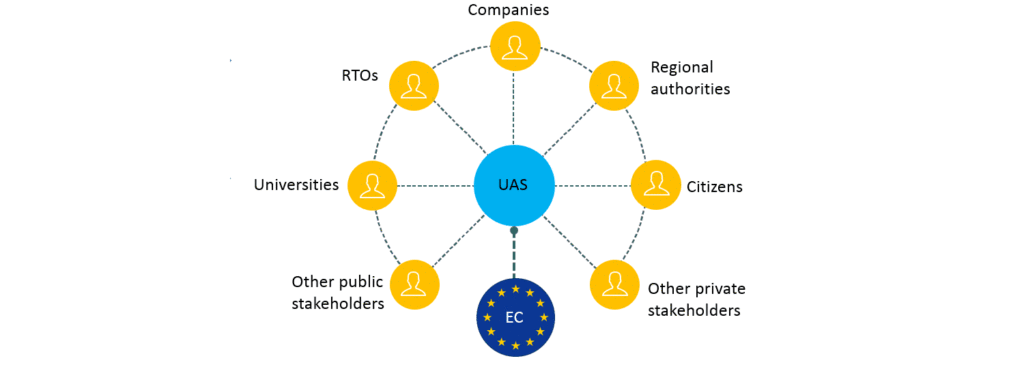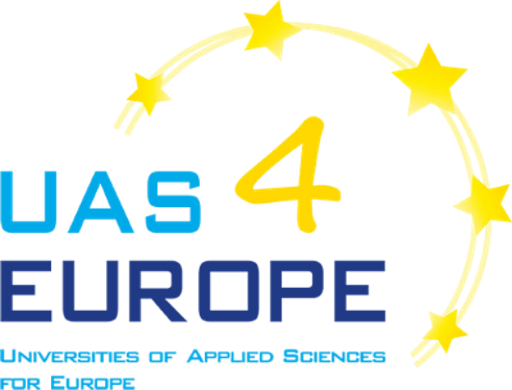Universities of applied sciences – or shorter: UAS – are present in many European countries and are known by different names. UAS are higher education institutes with a special focus on applied training and research. UAS focus on two priorities:
- Delivering applied and practice-oriented tertiary education, which includes degrees with an explicit professional orientation
- Applied research and innovation, which encompasses problem-oriented research and development (R&D) activities
UAS place a strong emphasis on a deep entanglement of providing high-quality higher education, scientific research and social services, which translate into practical training, practical applications and practical innovation. In UAS, knowledge valorisation and practice-oriented scientific research is intertwined with the educational activities, such as labs, projects and, not the least, through internships and workplace learning. This professional orientation during their studies makes the UAS student a useful contributor to the labor market and increases the graduate’s working life and employability skills. In addition, UAS students from time to time also participate in practical research tasks that culminate in innovation projects, which teachers have agreed on with the employer. This provides a win-win situation for both UAS and the employer.
We see universities of applied sciences in five roles that demonstrate their value to European research and innovation:
 |
As regional connectors
Experts with the right connections which cooperate on a permanent basis in the region with traditional universities, SMEs, industry, civil society and local and regional authorities. UAS are at the core of regional development and are in constant contact with all the important stakeholders. They can respond quickly to regional and market needs. |
 |
As key international players
Collaboration with people across borders, from all over Europe and from around the world. This ensures that UAS have a culture of openness and allows UAS to connect with a broad spectrum of contacts and networks. A genuine culture of sharing information and knowledge adds to the success of delivering projects with societal impact. |
 |
As competent project leaders and evaluators for European programmes
The European UAS are already taking the lead in various multidisciplinary projects. As research actors they have the competence and capacity to lead even more European projects. The UAS’ applied researchers have unique skill sets, which can contribute to and complement the skills offered by traditional universities and industry researchers, for example as evaluators of EU-funded projects. |
 |
As consulting bodies
Through their participation in discussions at the European and national levels, in advisory boards and in decision-making on calls for proposals in relevant fields of research and innovation. |
 |
As contributors to European entrepreneurship
The European UAS are the key educators of entrepreneurs in their regions. In this way, they contribute to European growth and to more jobs. The work-related skills that UAS offer their students strongly enhance their students’ employability and professional innovation through project work and set the trend. |
UAS as regional actors
Many European countries have a professional higher education system with UAS institutions that focus on education and applied sciences and innovation. Their regional role differs from country to country. Many institutions play an important role in the development of much needed regional human capital. They are significant actors in their regions and have strong networks with regional businesses, civil society and authorities. The UAS with strong reputations with regard to innovation can spin off start-ups in the region and boost the business climate.
The applied RDI agenda of UAS is not only determined by the world of work with the aim of meeting the needs of society and of the world of work. It also reflects the nature of the inputs of stakeholders. The research activities include various types of projects, multidisciplinary topics and research done in cooperation with and involving stakeholders. UAS by no means only focus on technology and industry, but also engage with societal actors to promote social innovation. The multidisciplinary nature of their work is part of their ‘genetic make-up’.

Due to the regional embedding and strong participation of applied research in regional development and policy processes, it is possible for UAS to act as driver of changes in society and regional development. Entrepreneurs, researchers, public authorities, lecturers and students are working together throughout Europe to improve the quality of professional education. They share a mindset in which cooperation between the public and private sectors is essential to meeting the demands of the present and future economy and labour market. They do so by conducting applied research together. They work together through smart partnerships for impact.
One example of these are the Centres of Expertise. Although not all the innovation partnerships of UAS go under the name of Centre, they do have in common that they bring UAS and SMEs, the private industry and non-profit organisations together to work on finding solutions to social issues. They do so along three lines:
- Applied Research aimed at focussing contributions on the innovation potential of companies;
- Initial Education to improve the quality of education and to increase the influx into initial education; and
- Lifelong Learning to increase the mobility and flexibility of existing staff.
In addition, the specific approach of professional higher education to RDI, and the involvement of students in it, contributes to improving the work skills, employability and learn-to-learn capacity of graduates. In regard to these areas of focus, the approach to applied RDI can be considered to be one of the major factors in the social and economic development of SMEs, companies and society.
